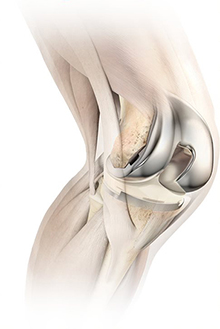What is Knee Arthritis?
- Category: News, Orthopedics, Joint Replacement
- Posted On:
Knees can sometimes feel sore or appear swollen after a workout or long day of walking. If you have noticed an increased level of pain and inflammation though, you may have arthritis of the knee. But what exactly is arthritis?
What Causes Arthritis of the Knee?
Arthritis is a disease that affects the cartilage and bones in joints. Joint cartilage is a tough, smooth tissue that covers the ends of bones where joints are located. It helps to cushion the bones during movement and, because it is smooth and slippery, it allows for motion with minimal friction.
Osteoarthritis is the most common form of arthritis in knees. It is a wear and tear condition that destroys the cartilage and exposes the bone ends. This cartilage destruction can result in painful bone-on-bone contact, along with swelling and loss of motion.
Arthritis can be caused by trauma, repetitive movement, age, or for no apparent reason. It can develop quickly over months or may take years to progress.
Knee Arthritis Symptoms
Arthritis of the knee can cause pain that interferes with daily activities like walking, exercise, and work, and it can keep you awake at night. Symptoms generally develop slowly and worsen over time, but they can also appear suddenly. According to the American Academy of Orthopedic Surgeons, the main symptoms of arthritis include pain, swelling, and stiffness. Other symptoms can include:
- Buckling of the knee
- Increased pain during weather changes
- Creaking, snapping, or grinding noises in the knee
- Gradual loss of knee range motion
- Stiffness or pain flare ups after resting for long periods of time or vigorous activities
Managing Pain from Arthritis of the Knee
While you cannot cure arthritis once it has developed, you may be able to slow the progression and alleviate the pain with lifestyle modifications, exercising, or knee replacement surgery.
Nonsurgical Treatment Options
You should always see if nonsurgical treatments work to alleviate pain before you schedule surgery. Sometimes avoiding certain activities, being active, or using assistive devices can help limit your daily disruptions from pain.
Pay attention to when your pain flares up or your knee feels more swollen to see if there is a correlation between the pain and specific activities. You may notice stiffness after long car rides or aches after climbing stairs. Try avoiding these activities, if possible, or make modifications to reduce the stress you put on your knees. For example, if you are taking a road trip, stop to stand up and stretch every so often.
Exercising can help reduce your pain and maintain your joint strength. When you work out, avoid high-impact activities that are tough on knees, like jogging or tennis. Instead, try low-impact exercises, like swimming or biking. You can also work with a physical therapist on specific exercises that target your affected knee.
A cane or knee brace may also be useful while moving to distribute your weight off your arthritic knee. If you are resting, apply heat or ice to your knee for additional pain relief.
Medications to Relieve Arthritis Pain
There are many medications that can help alleviate joint pain from arthritis. Always talk to your doctor before taking any new medication, as it may cause side effects or interact with another medication you are taking. Your doctor may also recommend an alternative option or dose because everyone reacts to medications differently.
Over-the-counter, non-narcotic pain relievers and anti-inflammatory medications are usually the first suggestions. Nonsteroidal anti-inflammatory drugs (or NSAIDs) include ibuprofen and naproxen and are available over-the-counter and by prescription. People with certain health conditions should be cautious when taking NSAIDs or avoid them altogether. Acetaminophen is another medication that can relieve pain, especially for those who cannot take traditional NSAIDs.
Knee Replacement Surgery
 Nonsurgical options may not work, or they may stop working as your arthritis worsens over time. If you notice your pain increasing despite your lifestyle modifications, it may be time to talk with your doctor about scheduling a knee replacement surgery.
Nonsurgical options may not work, or they may stop working as your arthritis worsens over time. If you notice your pain increasing despite your lifestyle modifications, it may be time to talk with your doctor about scheduling a knee replacement surgery.
A total knee replacement surgery aims to restore independence and reduce pain. The knee itself is not actually replaced, as is commonly thought. Instead, a metal implant is placed on the ends of the femur and tibia. A smooth plastic spacer goes in between the components to act like the cartilage used to. This creates a new, smooth cushion for a functioning joint and may reduce or eliminate pain.
Help for Arthritis Pain at Sauk Prairie Healthcare
Sauk Prairie Healthcare is here to help you manage and treat your arthritis. Our orthopedic surgeons can offer information and guidance to determine if a knee replacement surgery is right for you. If you are not ready for surgery, our physical therapists can provide education, exercises, and hands-on treatments to help manage your pain.
To schedule an appointment, call the Orthopedics Nurse Navigator at 608-643-7689.
